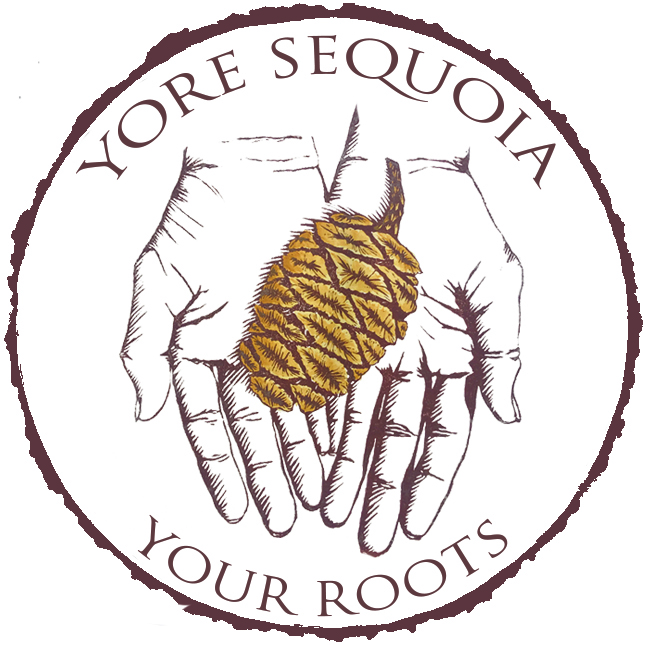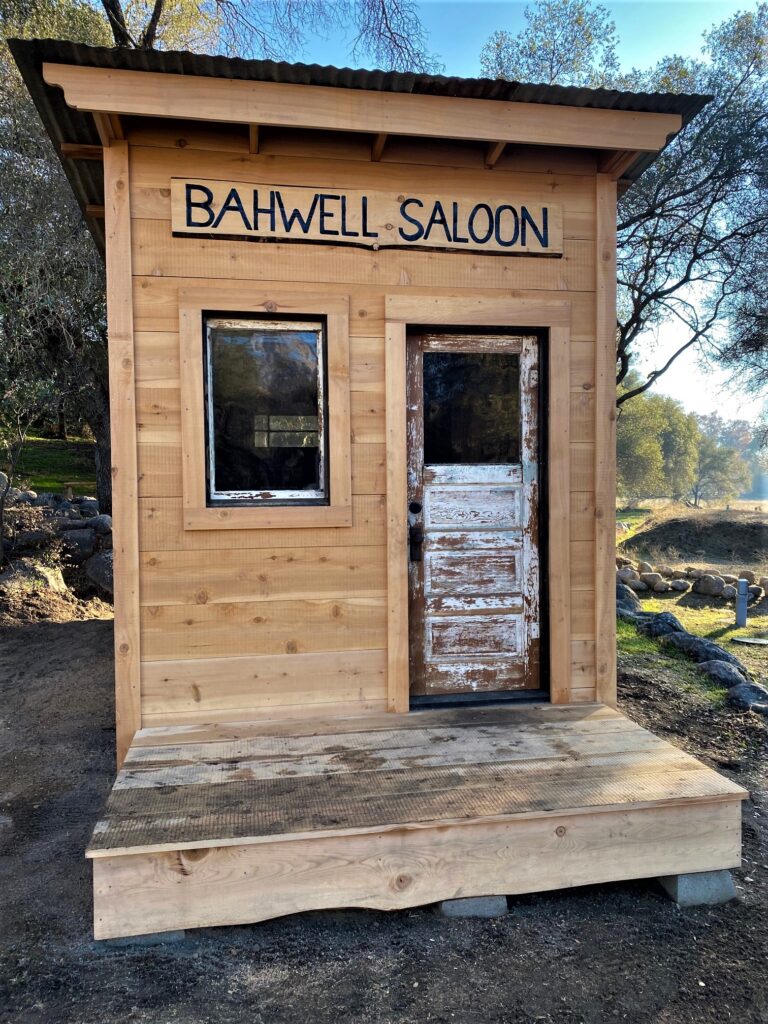The Three Rivers Historical Society grounds hold a re-creation of what is believed to be the first public saloon in Three Rivers.
By Laile Di Silvestro. This article is partially based on a 14 January 2021 article by John Elliott for 3RNews.
In January of 2021, the Three Rivers Historical Society unveiled a re-creation of the Bahwell Saloon, believed to be the first public saloon in Three Rivers. The structure is 8’x16’ with a windows enabling visitors can look inside. The re-creation is based on a 1907 photo and data collected during an archaeological investigation. According to the investigators, the original saloon was located just 35 feet from the site of the re-creation, above the Bahwell Ditch.
A pit or small cellar found by the archaeologists suggests that water from a nearby spring may have been used to cool the beverages until 1896, when water from the new Bahwell ditch was used for the purpose.
Despite the archaeological evidence, the history of the Bahwell Saloon has been shrouded by time.
Local lore suggests that the structure in the 1907 photo was created in 1895 and lasted until Prohibition shut it down on July 1, 1919. Historic documentation, however, indicates that the Bahwell family had a hospitality business entailing alcohol sales by 1892, and may have established a wayside for travelers to Mineral King by 1888.
Adam Bahwell (1830-1901) was baptised Adamus Bahwel in the Duchy of Hesse in Napoleon Bonaparte’s empire (later in Prussia and now in Germany). He left Hesse in 1846 and arrived in California by 1847. He was just in time to join the earliest rush to northern California’s gold fields.
Reportedly penniless after his mining adventure, Adam moved to Visalia in 1859, where he married Nancy Atlantic Stephenson (1843-1892) in 1861. The two immediately commenced building a family and a large business empire.
Adam became a wheelwright, repairman, blacksmith, farmer, sheep rancher, citrus nurseryman, and mortgage lender with no qualms about collecting on debts. He and Nancy acquired a block of land in Visalia, where they built some of their businesses. Their blacksmith shop was famous for producing and selling the acclaimed Bahwell pruning shears.
They didn’t limit their sights to Visalia, however. Over time, they acquired farming and ranching property throughout the San Joaquin valley, primarily in Tulare County.
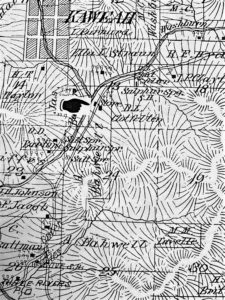
One of these properties was a tract in Three Rivers, where the Bahwells built a home on the south side of the Kaweah River, across from the confluence of the North Folk and the Middle Fork and below a footbridge across the river. Records suggest that Nancy, Adam, and their six surviving children move there in 1880, but returned to their Visalia home in 1881.
According to official records, the Bahwells didn’t move to Three Rivers permanently until late 1884 at the earliest. A that point, they had added two more children to their family, and their oldest son, Charles Franklin “Charley”, had suffered a serious harvesting accident.
By 1888, “Bahwell’s” was a landmark. Geologists surveying the area used it as a point of reference, and noted that there was a house on the site. They didn’t mention a hotel, store, or saloon, but it is possible that Bahwell’s served as a wayside at that time.
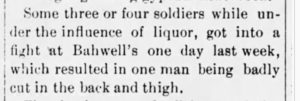
By 1892, however, the new county map indicated that there was a store and house on the land, and a newspaper account indicates that the Bahwells were serving alcohol to the 4th Cavalry soldiers assigned to protect the new Sequoia National Park.
Nancy died at the end of 1892, but Adam and the children continued running the hospitality business. Perhaps due to his history as a tough lender, Adam’s reputation began to suffer. In 1893, Adam was accused of assaulting the wife of one of the 4th Cavalry soldiers, and news media declared him “a bad man.”
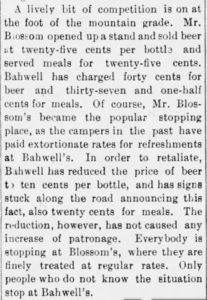
A newspaper report indicates that the Blossom family entered the roadside alcohol business in 1894, forcing the Bahwells to reduce the price of beer from 40 cents a bottle to 10 cents. The news media encouraged hungry and thirsty travelers to avoid Bahwell’s and buy from the Blossom family instead.
According to Forest Grunnigen (3RNews January 2021), the association of the saloon with the Bahwell family ended in the mid-1890s. According to official records, however. Adam Bahwell continued to run the hospitality business, and by 1900 considered his primary occupation that of hotel keeper.
By this time, Adam had become a very wealthy man. He was so wealthy, a young woman whom he had been wooing sued him for $25,000.00 for refusing to marry her. This is equivalent to $782,779.76 in spending power today.
Adam died in 1901 of dropsy (edema), and his son Charley inherited the property. It appears that Charley sold the saloon property within a decade.* At some point, according to local accounts, David F. Carter took it over.
According to local lore, the Bahwell Saloon survived WWI and the pandemic despite the growing prohibition movement. In November 1918, however, supply became an issue when the Wartime Prohibition Act banned the sale of beverages having an alcohol content greater than 1.28%. The 18th Amendment made the saloon’s demise final.
The saloon didn’t die quietly. Forest Grunnigen remembered having a beer at the saloon in July 1919 at the “grand closing party” when Prohibition became the law of the land.
*Confirmation of property transfers awaits the end of the 2019-2021 pandemic.

